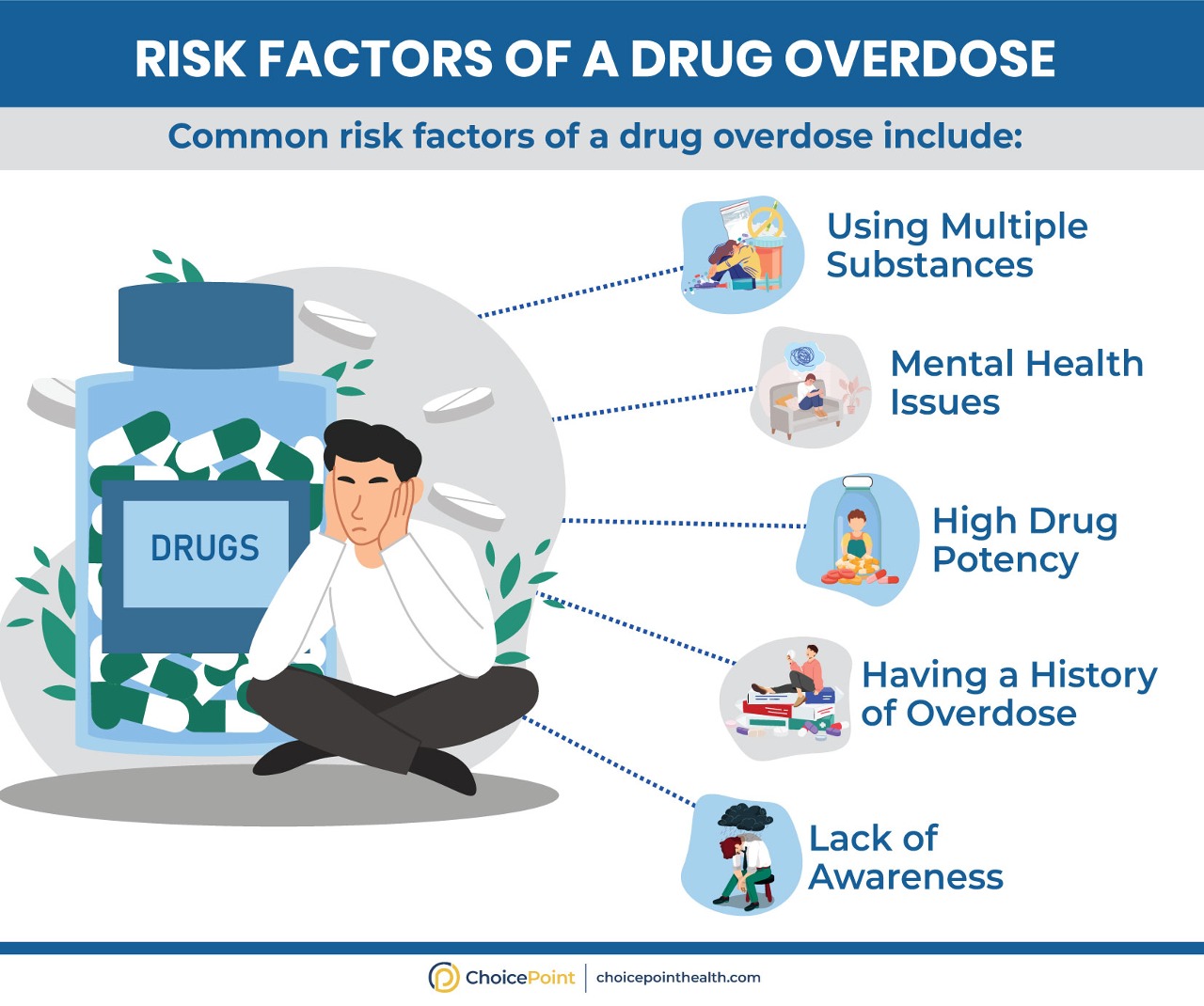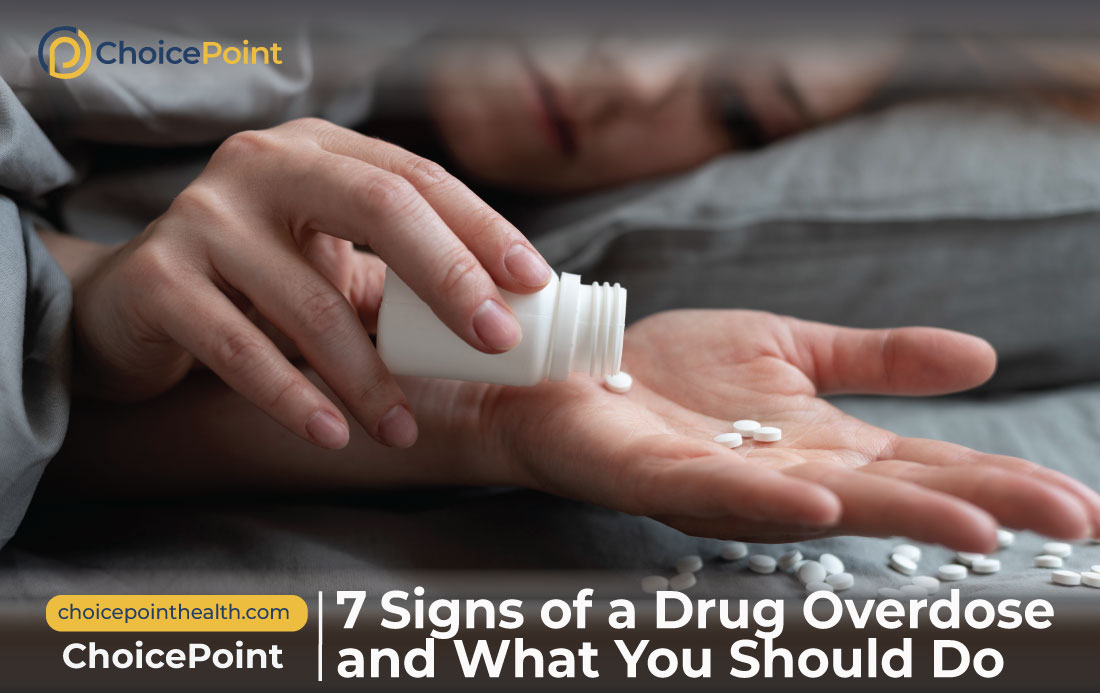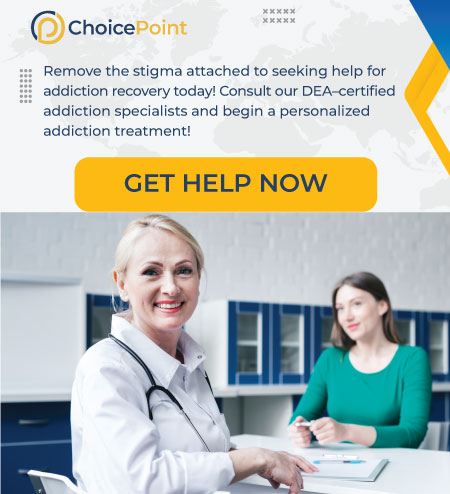Do you know that each year, drug overdose kills approximately 100,000 people in the United States? A drug overdose may occur when an individual consumes an excessive amount of an illicit drug, overwhelming the body and brain. It has the potential to be fatal or cause severe mental and physical illness, with consequences ranging from temporary to permanent. Let’s discuss in detail about 7 signs of a drug overdose and what you should do.
If you are looking for help from DEA-certified practitioners to assist you on your journey towards sobriety. Call ChoicePoint at 844.445.2563 for a personalized addiction treatment program that fits your needs and schedule!
Table of Contents
What Drugs Can You Overdose On?
Before moving on to what the key signs of a drug overdose include, let’s take a look at drugs that may cause an accidental overdose.
Opioids
Benzodiazepines
- Xanax (alprazolam)
- Valium (diazepam)
- Ativan (lorazepam)
Stimulants
Depressants
- Alcohol
- Barbiturates
Prescription Medications
- Antidepressants
- Antipsychotics
- Antihistamines
Illicit Substances
- MDMA (Ecstasy)
- LSD
- Ketamine
Synthetic Cannabinoids
- Spice
- K2
Inhalants
- Nitrous oxide (Whippets)
- Solvents (glue, paint thinners)
It’s important to note that any substance, when taken in excessive amounts, may lead to an overdose. Mixing drugs or combining them with alcohol may increase the risk if you suspect an overdose or witness someone exhibiting signs of overdose. It is crucial to seek emergency medical assistance immediately by calling a Drug Addiction Hotline.

Surprising fact you may not know: 2021, overdose deaths involving prescription opioids reached 16,706, heroin contributed to 9,173 deaths, cocaine to 24,486, and benzodiazepines to over 12,499. Strikingly, 69% of these overdoses affected males.

Surprising fact you may not know: 2021, overdose deaths involving prescription opioids reached 16,706, heroin contributed to 9,173 deaths, cocaine to 24,486, and benzodiazepines to over 12,499. Strikingly, 69% of these overdoses affected males.
7 Signs of a Drug Overdose and What You Should Do
A drug overdose may occur with various drugs, both legal and illegal. The risk of a drug overdose depends on factors such as;
- The drug(s) used
- What amount was used?
- How the drug was consumed: smoked, snorted, or injected
- Age and health of the individual
- Previous experiences with drugs and overdose
Take a quick look at what an individual should do in case of an accidental drug overdose. The 7 key signs of a drug overdose include:
Sign#1- Being Unresponsive
- The person may become unresponsive and don’t react to any stimuli.
- They may not even wake up when another person speaks loudly to them or shake their shoulders.
- Extreme drowsiness or an inability to stay awake.
What to Do
- Try to wake them up by speaking loudly to them and gently shaking their shoulders.
- Check if the person is breathing and perform CPR if necessary.
Sign#2- Difficulty in Breathing
- The overdose victim may show signs of shallow or difficult breathing.
- Sometimes, the person may even stop breathing.
- They make choking sounds or rasping noises while trying to breathe
What to Do
- If you’re trained, then administer rescue breaths. Rescue breathing is critical for survival during a drug overdose because it keeps the brain alive.
- Ensure an open airway.
- Check for any obstructions in the patient’s mouth.
- Remove any obstructions.
- To open the airway, tilt the person’s head back. Keep the patient’s head tilted back, pinch his nose, and take two rescue breaths.
Sign#3- Being Confused or Agitated
- The drug overdose victim may be extremely confused.
- Show signs of disorientation or heightened agitation.
- They may have trouble staying awake and lower alertness.
What to Do
- Keep a safe distance, but stay with the person.
- Speak in a low tone.
- Do not make them more agitated.
- Calm them down.
Sign#4- Having Seizures
- Muscle rigidity.
- Convulsive movements.
- Their face is extremely pale or feels clammy to the touch.
- Biting the tongue or the inside of the cheek.
What to Do
- Move close objects away to protect the person from injury.
- Refrain from giving the person food or water.
- After the seizure, turn them onto their side and call for medical assistance.
- Stay with the person until the medical team arrives.

Risk Factors for Drug Overdose in Young People
Sign#5- Chest Pain and Irregular Heartbeat
- Pain or discomfort in the chest is common during a drug overdose.
- Drugs or the overall stress of an overdose situation can contribute to anxiety or panic attacks.
- Narrowing of blood vessels leads to chest pain.
What to Do
- Keep a close eye on the person and their vital signs.
- Try to stay calm and focused.
- If the person is conscious, reassure them and try to keep them calm.
- Perform CPR (if you are a professional).
Sign#6- Nausea and Vomiting
- Persistent or uncontrollable vomiting.
- There are signs that they have vomited.
- Gurgling noises from the mouth.
What to Do
- Prevent choking on vomit.
- Keep them sitting.
- Provide a wastebasket or take them to the toilet.
Sign#7- Blue Lips or Fingertips
- Lips and fingertips will turn blue.
- This indicates a lack of oxygen.
- Cold or clammy skin.
What to Do
- Keep the person warm and call for medical assistance.
- Rub their hands and feet.
- Carefully turn the person onto their side in the recovery position.
NOTE: Remember, in any emergency, your priority should be to call for a drug abuse helpline. Properly trained healthcare providers are better equipped to handle these situations.

Addiction is a disease, but it’s the only one you can get yelled at for having.” – Mitch Hedberg.

Addiction is a disease, but it’s the only one you can get yelled at for having.” – Mitch Hedberg.
Parental Awareness- Recognize these Early Warning Signs of Drug Overdose in Teens
Being a parent is hard. Let alone being a parent of a teen struggling with substance abuse. As parents, you have to keep an eye out for early warning signs of drug overdose. The key signs of a drug overdose in teens include
- Withdrawal from family and friends
- Alterations in mood and unexplained personality changes can indicate an underlying issue.
- Changes in social circle
- A sudden decline in grades or lack of interest in school.
- Bloodshot eyes, dilated or constricted pupils, unexplained weight loss, or poor personal hygiene.
- Secretive behavior regarding social activities
- Unexplained financial difficulties
- Changes in sleeping patterns
- Unexplained injuries
- Frequent health complaints
If you observe multiple warning signs or are genuinely concerned about your teen’s well-being, seeking professional help is crucial. Consulting with a healthcare professional or addiction specialist may provide valuable insights and guidance on the appropriate steps.
Call 844.445.2563 and begin the Student Addiction Treatment Program at ChoicePoint. We also offer personalized programs for Veterans and Pregnant Women!
Helpful Q&A Section for Signs of a Drug Overdose
Take a look at some commonly asked questions regarding key signs of a drug overdose.
What Are the Symptoms of a Fatal Overdose?
The key signs of a fatal drug overdose include:
- Unconsciousness or unresponsiveness
- Slowed or stopped breathing
- Snoring or gurgling sounds
- Cold or clammy skin
- Discolored lips or fingernails
- Small pupils
- Seizures
- Vomiting
- Convulsions
- Heart attack
- Stroke
Which Drug Is the Worst to Overdose On, and Why?
Opioids, such as fentanyl, are particularly dangerous to overdose on due to their potent respiratory-depressant effects. It often leads to severe respiratory failure and a high risk of fatality.
What Age Should You Start Talking To Your Kids About Drugs to Prevent Drug Overdose?
If your child is older than 6, or whenever your child starts asking, start talking with them about drugs, alcohol, and tobacco. It is better to give them proper education in the early years to prevent drug abuse.
Can Overdoses Occur with Prescription Medications?
Yes! Prescription medications, especially opioids and benzodiazepines, may cause a drug overdose if taken in excessive amounts or combined with other substances.
How Do Opioids Contribute to Overdoses, and Is Naloxone Effective in Reversing Overdoses?
Opioids may depress the central nervous system, leading to slowed or stopped breathing. Opioid overdose symptoms include:
- pinpoint pupils
- extreme drowsiness
- loss of consciousness
Yes, Naloxone is a life-saving medication that may reverse opioid overdoses by restoring normal breathing. It is available in various forms and can be administered by bystanders.
How Can I Help Prevent Overdoses and What Is the Importance of Seeking Professional Help in an Overdose Situation?
To prevent an accidental drug overdose:
- Safely store medications
- educate yourself and others about the risks
- seek medical advice before combining medications
- be aware of signs of substance misuse
Timely medical intervention is crucial to address the specific complications of an overdose, provide appropriate treatments, and improve the chances of a positive outcome.
Medical Disclaimer:
ChoicePoint aims to improve the quality of life for people struggling with substance use disorder and mental health issues. Our team of licensed medical professionals research, edit and review the content before publishing. However, this information is not intended to be a substitute for professional medical advice, diagnosis, or treatment. For medical advice please consult your physicians or ChoicePoint's qualified staff.










Review 7 Signs of a Drug Overdose and What You Should Do.